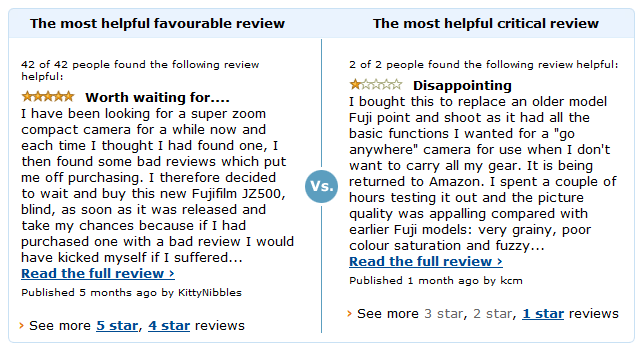A long time ago, I could go into a sports shop, look along the line of trainers, pick one I liked that was the right size, colour and price, pay for it and go. Recently, inspired by a growing waistline and a bundle of thirty-mumble-mumble-mumble-th birthday vouchers, I tried the same thing on Amazon – only to run into a wall of purchasing doubt.
The same brands, colours and sizes were all present. Tick boxes and drop-down menus made it easy to choose exactly what I wanted thanks to Amazon’s intuitive design. Yet, every time my cursor neared the Add to Basket button, doubt and hesitation struck. What if that one negative review means I will have wasted my money? Was that really the best price? Is there another product like this one but just a little better for the same price that has all positive reviews? Before I know it I’m trawling through more product pages with doubt growing even stronger and the chance of a quick and easy purchase has vanished.
Some purchase decisions rely more on reviews than others
Not all purchases online are harder, it just depends on what you’re buying. I can buy books, DVDs and games online without a thought, knowing that the price is cheap, delivery will be fast and it takes a lot of the donkey work out of buying presents.
But, go beyond these modern staples of life, and things suddenly get a lot trickier. Reviews mean more when people actually use something, be it a bike, tent, shoe or cleaning product. Reviews also come into play more when you’re unsure about what to buy, do I need one of these to fix my specific problem or should I get one of those? At that point four stars suddenly look less than perfect, three stars positively average and don’t even think about something with a two-star rating. You might not even look behind the rating to find there are only two jokey or caustic reviews from users who, possibly, brought the wrong product for them anyway.
Negative reviews can counteract positive ones causing doubt in a purchase decision
Does online shopping force us to focus on the detail?
Comparisons between products can also get in the way of a buying decision. Anything complex such as a laptop can see endless variations between “similar” models, that confuse and confound someone who just wants to “do Facebook and email.” Does offering users all this extra information with reviews, product descriptions, videos and price comparisons really make shopping easier? Or is it making us focus more on the detail too much? What should be a happy moment when you buy that new gadget is now one which is anxiety filled and doubt ridden, even after it arrives at your door.
A lot of ecommerce sites have copied each other assuming that adding product reviews and more information is the way to get more sales. But, if anything, it is possible that the more data available at the time of purchase, the more likely people are to compare data, focus on the detail and start their quest for the perfect product elsewhere on the web.
Perhaps online stores should encourage users to reduce their focus on data (but continue to provide this information) and instead attempt to influence a more emotional purchase decision.
What do you think? Are users being over informed?

